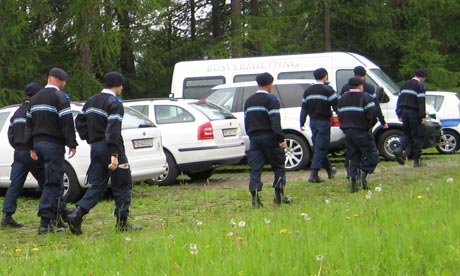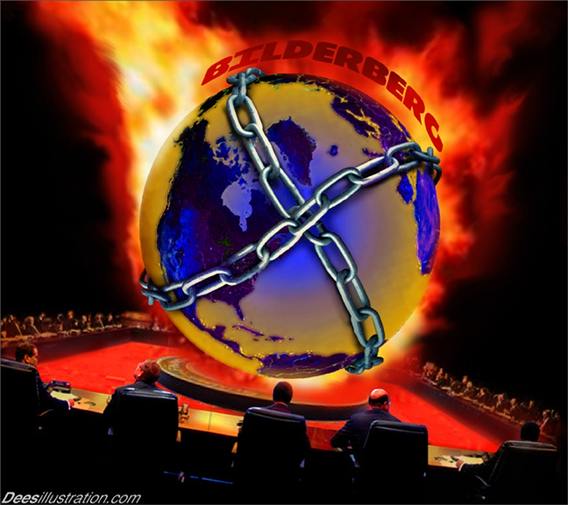Extracts from Bilderberg Lord John Hope’s notes in 1958:
Everyone recognised that the weakness of a democracy was that its government had to do broadly what the people wanted it to do …

Privates on parade: the Bilderberg security takes position. Photograph: M Petrisch
You know you’re in Switzerland when the public lavatory at the multi-storey car park is cleaner than your own bathroom. And the streets! My God, you could eat your dinner off the pavement in St Moritz. I’m seriously thinking of writing to Tower Hamlets council suggesting they come here on a fact-finding tour. Although what the hell are they doing on a freebie junket to Switzerland when they’re busy cutting our rubbish collections? It’s a disgrace! I’m going to write to Tower Hamlets council to complain.
I don’t know quite what I was expecting from a Swiss Bilderberg. I was expecting it clean, but I wasn’t expecting the Bilderberg I’ve found. For one thing, I was imagining a rather muted atmosphere, stern even – batons up, visors down – but there’s a happy buzz around the venue: the conference doesn’t kick off until Thursday but already there’s a growing crowd of journalists, bloggers and activists. The social justice group We Are Change are here in force. And (praise be!) representatives of the mainstream media are rolling up.
One of them is Anna Caprez, a journalist from Radio Rumantch, the Swiss radio station. She’s putting together a series of reports about the conference. “It’s a big story”, she says. “But only in March or April did we realize what Bilderberg is, or even that there is a Bilderberg conference.”
She says it’s unusual to have the press descend on St Moritz like this. “We’re used to letting people do what they want here in the valley, in the Engadine. St Moritz is a special place. VIPs can be incognito, we’re used to famous people – who cares? – they can act and react without the press crawling over them. But this is different. This is important. And the media in Switzerland has finally woken up to it. The Swiss TV are coming, Swiss Radio, the Italian media. And it is thanks to him.”
Anna nods towards a man smoking a cheroot, enjoying a rare glimpse of alpine sun. “It is thanks to Manfred”. The Manfred in question takes a peek down a foot-long camera lens, which he’s focusing down on a security briefing in the hotel lobby. “There must be 300 security, easily” he growls.
Manfred Petrisch is a Swiss blogger and a long-time Bilderbotherer. This year, the conference is on his home turf, and he’s been lobbying politicians and the mainstream press for weeks.
“We put pressure on the media, we ask: “Why aren’t you reporting this?” – and now at last they have started. Of course, some of what they write is the usual, you know: just a meeting of some old guys sitting round, having a cup of tea.” He snorts his derision: “Come on! A four-day cup of tea, with heads of global companies, heads of state, EU commissioners, leaders of Nato, bank CEOs, people with a full schedule. They are not here for a cup of tea!”
Manfred has pulled strings with politicians, and questions have been asked in the Swiss parliament. “We asked and asked again: who is paying for all this? If we are to have a huge police force protecting a private meeting, as usual, then who is paying? The taxpayer? We made it a political problem.”
And the pressure seems to have paid off. “Look at what has happened! There is no police line, there is only private security. And they are not armed, not threatening, like in Greece or Spain. They are quite friendly. Of course, there are police here, inside the hotel, and secret services, lots of them, but they are in the background. This is a big victory.”
And it’s true – at first glance, this year’s conference could hardly be more different from Spain 2010 or Greece 2009. We’re standing, unharrassed, on a pavement not 50 metres from the hotel. Last year, in Sitges, the press was kept a kilometre away, at the business end of a machine gun. In Vouliagmeni the cordon was even wider, maybe a kilometre and a half, with (literally) hundreds of pumped-up policemen strip searching and camera snatching. St Moritz may be further from the beach, but apart from that it’s a gigantic improvement. “This is Switzerland!” explains Manfred. “That sort of thing cannot happen here. This is a democracy.”
Democracy is an idea that doesn’t fit easily with Bilderberg. For all you budding Bilderberg historians out there, here’s an interesting titbit. Back in 1958, when the conference had only been going a few years, Lord John Hope, the Tory politician who was joint under-secretary of state for Scotland at the time, reported back from a two-day meeting of Bilderberg’s steering committee in April: “the meeting was a preparatory one before the meeting of the Bilderberg Group at Buxton in September.” Here’s part of what he wrote:

Extracts from Lord John Hope’s notes in 1958
Everyone recognised that the weakness of a democracy was that its government had to do broadly what the people wanted it to do …
(Damn that pesky democratic process! Always getting in the way of us doing what we want! What a bore!)
Now, if you’re anything like me, you’ll find that quotation a little uncomfortable. Or if you’re anything like David Aaronovitch, you’ll have scoffed so hard at it that you’re currently wiping spittle off your computer screen.
Aaronovitch is cheerleader-in-chief of the cup of tea brigade: “To have a strong belief in the Bilderberg Group means believing in a fantasy,” he says. “It replaces the intolerable thought that there’s nothing at work at all, that the world is chaotic. It may be a form of therapy but it has people believing in an anti-scientific message.”
Blimey. What I find most extraordinary about those remarks is not so much their appalling ignorance, it’s more that Aaronovitch appears to be making a quasi-religious statement. It’s an expression of faith: faith in there being “nothing at work at all” in the world – faith that the world is “chaotic” through-and-through.
A fairly extreme position, one could almost call it fundamentalist. What then is history? Stones being shaken in bucket? Has ever a human influenced the course of events? Are the attendees of Bilderberg in any sense influential? And if not, what on earth have they been doing all their lives? They might as well have sat jibbering on a rock rather than becoming secretaries of state and finance ministers, for all the good it’ll do them.
We can expect more of this fantasy/”old farts playing golf” spin over the next several days. (I can’t wait for David Frum’s annual scoff piece). But it sounds more and more detached from reality with every passing year. The more serious press attention that’s given to this serious political event, the less it’s possible to dismiss it. Give it another year, and it’ll seem as bonkers to dismiss Bilderberg as a fantasy as it would be to say Davos is a meeting of Mumsnet.
The Swiss activist Andrew M?ller, a member of We Are Change, takes a distinctly unAaronovitchian view of Bilderberg: “The media represent the fourth power in a democracy. They should be responsible for covering such things. If the heads of the media are meeting in secret with our politicians like this, then it is a dangerous situation for democracy.” And you don’t have to think every event dangles from a string tied to David Rockefeller’s fingers to agree.
• Historical footnote: good luck finding any reference to that April 1958 get-together of the Bilderberg steering committee in the official records. They don’t like to talk about the steering committee meetings … but don’t worry, we’ll be talking more about them in articles to come. I bet you can hardly wait!
Posted by Charlie Skelton Wednesday 8 June 2011
Source: The Guardian
